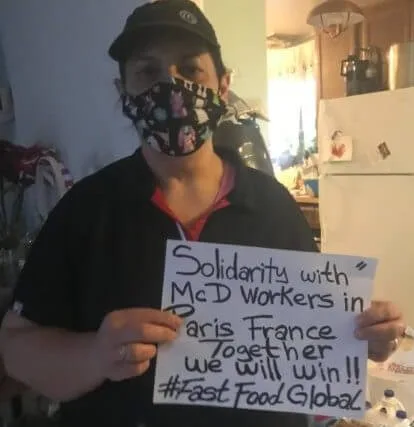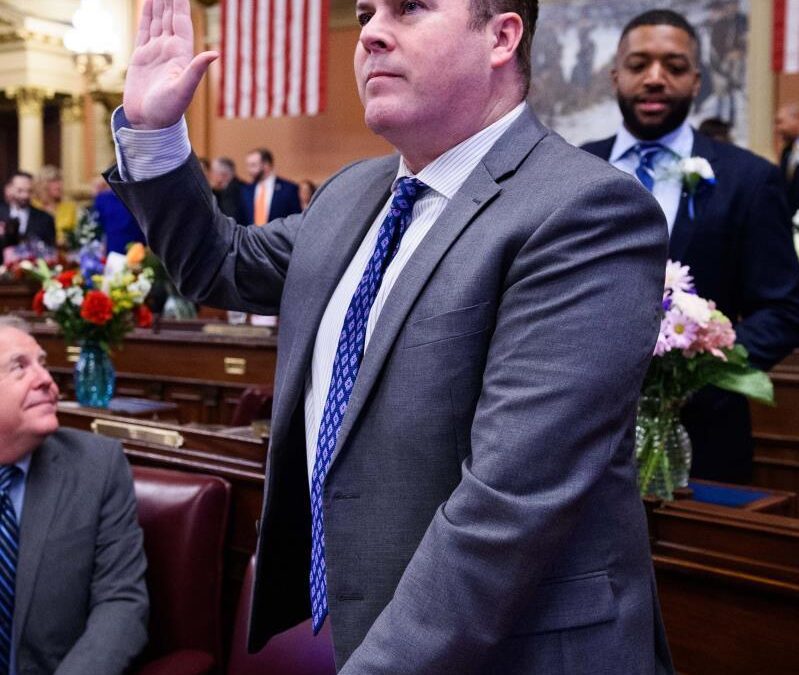
Imelda Rosales (Courtesy of Fight for 15)
Fast-food workers from 15 cities across the nation are going on strike demanding that companies like McDonald’s implement a $15 per hour minimum wage.
When Rita Blalock began working at McDonald’s, she earned $7.25 per hour and struggled to scrape by. Ten years have passed since then and Blalock still finds herself in a similar position.
The 54-year-old Raleigh, North Carolina resident’s pay has only increased marginally. She now makes $10 per hour as a cook, but receives no healthcare or paid sick leave, and has lived in rooming houses for the past “seven or eight years” because she can’t afford an apartment of her own.
In fact, the only reason she even earns the wage she does now is because she spoke out in the early days of the coronavirus pandemic, which she said prompted the company to give her a raise to try to quiet her voice.
“A lot of companies don’t like you to speak out. They think if they give you some hush money, you’re going to be quiet. Not me,” Blalock told COURIER. “I’m not going to be quiet.”
Blalock is speaking out once again on Friday, joining fast-food workers from 15 cities across the nation in a strike demanding that companies like McDonald’s implement a $15 per hour minimum wage. The striking workers are also calling on President-elect Joe Biden to raise the federal minimum wage—which has remained at $7.25 for more than a decade—to $15 in his first 100 days.
“I need this $15,” Blalock said.
Currently, Blalock is only able to afford the bare essentials, such as rent, food, and transportation. But a $15 minimum wage would be life-changing for her. She could get out of the “rat hole” of a rooming house she’s staying in and get her own apartment. She would also finally be able to treat herself to some of life’s basic pleasures that so many others take for granted.
“I can’t eat out, I can’t buy new clothes,” Blalock said, discussing what it’s like to earn only $10 per hour. “I could start doing things that I would like to do for myself that I can’t do at the moment because I can’t afford it.”
Blalock is one of an estimated 23 million Americans who would see their pay rise under a $15 per hour minimum wage, according to a 2019 study from the Economic Policy Institute (EPI).
Low-wage workers are disproportionately people of color—like Blalock—and research has shown that hiking the minimum wage would also help address the racial wage gap. A $15 minimum wage would increase wages for 38% of Black workers according to the EPI. It would also benefit countless Latino workers who are also disproportionately likely to work low-wage jobs.
Raising Her Voice to Get Others a Fair Wage
Imelda Rosales, a 53-year-old McDonald’s worker in Littlerock, California, is one of those Latino workers and is also striking on Friday. Rosales has worked at her job for 11 years and earns $15.50 an hour as a maintenance worker, but still struggles to get by. She, her husband, and her three children who live at home live “day to day.” Things have gotten even harder during the pandemic, because her husband and two of her children have lost a lot of their work in construction.
“It’s been really difficult,” Rosales said through a translator. “I’m having to take on the responsibility of paying the majority of bills because they’re not working as much.”

While a minimum wage increase wouldn’t directly benefit Rosales, she is striking on Friday to express solidarity and make her voice heard.
“We all have to have a fair wage. Just like I have over $15, we should all be making at least that,” Rosales said. “I’m going to advocate for workers’ voices, because during this pandemic, we’ve seen that employers don’t treat us like humans, so we need to demand that they see us like that. We want to have more benefits for workers, so we know that we need to raise our voice.”
The Fair Wage Legacy of Dr. Martin Luther King Jr.
Organizers didn’t choose Friday’s action at random. The day marks the birthday of the great Dr. Martin Luther King Jr., who was known for his labor advocacy.
“He did this kind of work; striking and trying to help people get raises. He marched for the same reasons that we’re marching for—justice,” Blalock said. “That’s why I’m going on the march—for Martin Luther King and everything that he stood for, plus $15 an hour.”
Thomas Dixon, a pastor in North Charleston, South Carolina, who advocates for a $15 minimum wage, pointed out that labor was the issue that led Dr. King to the place of his death, Memphis, Tennessee, where he was supporting sanitation workers who went on strike.
“He wouldn’t have been there in Memphis had it not been for labor— demanding higher wages, demanding better working conditions on the job and respect for workers on the job, demanding the right to unionize,” Dixon told COURIER. “It sounds a lot like what the Fight for 15 is all about today and it’s a shame that we are this far removed from Dr. King and Memphis, Tennessee, and we still are fighting the same fight. Our nation should be really embarrassed over that.”
House Democrats passed legislation in 2019 raising the minimum wage to $15 per hour, but the bill died in the Republican-controlled Senate. The push for a $15 minimum wage received a huge boost, however, after Democrats won both senate seats in Georgia’s Jan. 5 runoffs, giving them control of the US Senate in addition to the House and the White House.
President-elect Biden has repeatedly said that he would fight to raise the federal minimum wage to $15 per hour. On Thursday, he reiterated that increasing the minimum rate is a key part of his agenda by including it in his $1.9 trillion coronavirus relief plan. “No one working 40 hours a week should still be below the poverty line,” Biden said as he unveiled his plan.
Blalock is hopeful that Biden will live up to his promise and do what he can to push for an increase.
“If he doesn’t try to raise the minimum wage for the whole country, a lot of people are going to be in the same situation that we’re in now,” she said. “I would hope and pray that they would try to change it within the first 100 days because it would make a lot of difference.”
The Economics of Raising the Minimum Wage
Raising the minimum wage is an enormously popular idea; two-thirds of Americans support raising it to $15 per hour, according to a 2019 Pew Survey. The question is whether enough Republicans will get on board to surpass the necessary 60-vote threshold in the Senate for legislation. Republicans have for years opposed minimum wage increases, arguing it would lead to job losses.
While anecdotal research indicates job losses are not out of the question, the “bulk of the research in the minimum wage just does not show that there are a whole lot of negative impacts in terms of jobs,” according to Yannet Lathrop, a minimum wage expert and a Senior Researcher and Policy Analyst at the National employment Law Project.
“The data is not on their side,” Lanthrop said of those who oppose raising the minimum wage.
Indeed, recent studies of cities that raised their minimum wage to $15 per hour have shown that increasing the minimum wage did not have much impact on employment. Other studies have shown that raising the minimum rate would have a positive impact on low-wage workers, reducing poverty and increasing consumer spending.
“Our economy is driven not by trickle down economics. That’s been proven,” Dixon said. “It’s driven by money being pumped into the lowest wage earners, people who make the least amount of money spend everything that they get. They spend the most because they don’t have much, so they spend all of it.”
Lanthrop also supports a $15 minimum wage and said it would represent a huge step towards more economic security for low-wage workers across the country, particularly in the 21 states that still rely on the federal minimum wage. The vast majority of those states are led by Republicans, who have for years blocked increases to the minimum wage.
“For workers in those states, the federal minimum wage is the way to raise wages and in many of those states, legislatures have proven to be either opponents or just not interested in raising wages,” Lanthrop said. “It’s very important for those workers in those states that there’s some action at the federal level to raise wages.”
It’s not just Republicans who are opposed to increasing the minimum wage, though. Small business owners have also expressed concern about a $15 minimum wage and how it would affect their businesses.
Dixon acknowledged that increasing the minimum wage would be a tougher pill to swallow for small businesses and suggested implementing a sliding scale to transition them to the $15 rate more gradually, based on profits.
“I’ll readily say that small businesses would be taken out if they were just forced to just jump up to $15,” he said. “But if we’re smart enough to put a person on the moon or take a heart out of a person’s body, we’re smart enough to factor in how to save small businesses.”
A Higher Minimum Wage Benefits Society as a Whole
Beyond the economic benefits, a higher minimum wage could also benefit society as a whole. Research has found that increasing the minimum wage increases worker productivity, reduces job turnover, leads to a decrease in suicides, improves health outcomes, causes a decrease in recidivism, and increases overall well-being.
Dixon, who previously served time in prison on drug and alcohol charges, said he discovered how all these issues tie together after becoming a pastor and engaging in advocacy.
“I started realizing the role that economic disparities play in contributing to those who go into the prison system, and that contributes to gun violence. And then I realized the educational disparities that contribute to all of that and the healthcare disparities,” Dixon said. “All of the social justice issues that we face—there’s an intersectionality involved in them.”
Dixon believes that raising the minimum wage is a key step in advancing social justice and improving equality, especially among Black communities that he said have been set-up to fail. These communities lack strong educational or employment opportunities, Dixon said, which forces some people to resort to illegal activities to get by.
“They have to make money some kind of way, because money is required to live,” he said. “All of those things are contributing factors to our incarceration rates and to the death rate in our community.”
Whether Blalock, Rosales and her peers succeed remains to be seen and hinges on whether Republicans and more moderate Democrats in the Senate get on board with the idea of a higher minimum wage.
Blalock has some strong words for those who might oppose an effort to raise the minimum wage to $15 per hour.
“I would say they need to be in my shoes, because it’s hard out here trying to make it on $10 an hour and they make a hell of a lot more money than I do,” Blalock said. “None of them has ever been in this kind of situation. So they just need to change shoes for a minute and see how we are struggling and that we do need the $15.”
Politics

Philadelphia DA cancels arrest warrant for state Rep. Kevin Boyle on eve of Pa. primary
Philadelphia District Attorney Larry Krasner said a detective had sought the warrant against Boyle, a Democrat whose district includes a section of...

Influencers and creators find new ways to engage young Philadelphia voters
Rec Philly, a space for creators and influencers, teamed up with Show Up Strong to get hundreds of young Philadelphia residents engaged in the...

New Biden rule protects privacy of women seeking abortions
Under the new rules, state officials and law enforcement cannot obtain medical records related to lawful reproductive health care with the goal of...
Local News

Conjoined twins from Berks County die at age 62
Conjoined twins Lori and George Schappell, who pursued separate careers, interests and relationships during lives that defied medical expectations,...

Railroad agrees to $600 million settlement for fiery Ohio derailment, residents fear it’s not enough
Norfolk Southern has agreed to pay $600 million in a class-action lawsuit settlement for a fiery train derailment in February 2023 in eastern Ohio,...






